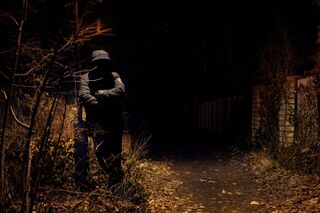Law and Crime
Red Flags That Somebody Might Be a Fugitive
Subtle signs that someone you barely notice might be intentionally evasive.
Posted May 30, 2021 Reviewed by Abigail Fagan
Key points
- The amount of time and effort devoted to tracking “wanted” persons depends on what they are wanted for.
- People in hiding are sometimes identified by their desire to avoid being noticed.
- Fugitives may be mild-mannered, have no digital footprint, keep no photos of themselves or their family, or hide identifiable clothing labels.
The term “fugitive” calls to mind Bonnie and Clyde-type sensational stories, or high-profile criminals who have escaped police custody. In reality, not all fugitives are armed and dangerous serial killers. What most have in common, however, regardless of the allegations against them, is a willingness to evade submitting to the criminal justice system.

Fugitives Often Hide in Plain Sight
As a career prosecutor, I have seen in practice what is portrayed in Hollywood crime dramas: the amount of time and effort devoted to tracking “wanted” persons depends on what they are wanted for.
Police use different methods of tracking fleeing felons versus fraudsters. But either way, the reality is that although it is rare, outlaws walk among us. We may work with them, live near them, or (gulp) pay them to watch our children. This is concerning to many law-abiding citizens because regardless of the alleged crime, the choice to flee rather than face the music can reflect disrespect for the law and lack of responsibility.
How do you spot someone who is intentionally elusive? Through their efforts to avoid being spotted.
Fugitives Invest in Being Nondescript
You won’t remember someone you don’t see in the first place. Accordingly, you are unlikely to “see” a fugitive at a social event; you are unlikely to see them at all if they can help it. Notice how the murderer next door is often described as having “kept to himself.” Research on sex offender fugitives who failed to register found they were five times more likely to live alone, even after controlling for other background and demographic factors.[i]
If you want to be noticed, go bold. Smart fugitives go bland. Bland and boring. How can you tell if the yawn factor is intentional? After all, many people dress down, avoid flashy clothing, and keep a low profile.
Here is a clue: expending energy and effort to be intentionally nondescript can itself be a red flag. Most people like to be recognized, acknowledged, appreciated. Someone running from the law will avoid even being seen, much less recognized in any setting.
While many people wear bright colors and fashion trends hoping you notice their sense of style and therefore notice them, wanted persons often wear neutral colors and avoid displaying identifying features on anything they own. For example, they may remove the designer label from an article of clothing or bag, wear an expensive shirt inside out to hide the designer logo, or strategically cover it up.
Online, someone lying low will not have a digital footprint—because those are easier to track than real ones. In a day and age where almost everyone has some type of profile on Facebook or elsewhere, digital absence often reflects intentional discretion.
Wanted persons are often mild-mannered and unmemorable. Hotheads keep a trail burning by making waves through complaining or displaying anger. A wanted man or woman will often be cool as a cucumber as they glide through their day without leaving anything to remember them by. They avoid doing or saying anything out of the ordinary. From conversation word choice to restaurant meal choice, their behavior is calculated to be typical and forgettable.
We might expect fugitives to alter their appearance, seeking to deceive through a disguise. But we won’t know they have done so unless we have something to compare it to. Although not singularly determinative, someone who has zero photographs of themselves or their families in a day and age where everyone’s devices are full of photo galleries might be hiding their identity. Because consistency is credibility, someone who seems to have no past may have a criminal past.
So whether you want to fight crime or just choose your friends carefully, these signs can help you detect when someone does not want to be seen.
References
[i] Bierie, David M., and Paul J. Detar. 2016. “Geographic and Social Movement of Sex Offender Fugitives.” Crime & Delinquency 62 (8): 983–1002. doi:10.1177/0011128714530658.


